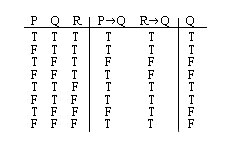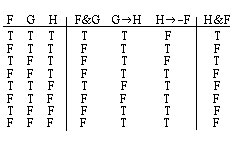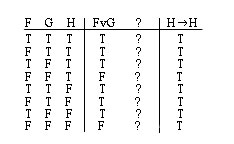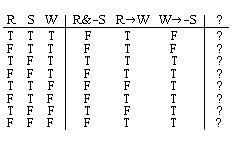-
An argument is valid if and only if:
-
If the premises are true, then the conclusion must be true.
-
The premises are true and the conclusion is true.
-
If the conclusion is true, then the premises must be true.
-
The premises are true if and only if the conclusion is true.
-
An argument is shown to be valid on the table method if and only if:
-
There is no counterexample.
-
There is at least one counterexample.
-
There is no row on which all formulas are false.
-
There is a row on which all the premises are true and the conclusion is true.
-
On the table method, a counterexample is:
-
A row on which the premises are false and the conclusion is true.
-
A row on which the premises are true and the conclusion is false.
-
A and B are both counterexamples.
-
Neither A nor B are counterexamples.
-
If one of the premises in an argument is a contradiction, then:
-
The argument must be valid, because any conclusion can follow from a contradiction.
-
The argument must be invalid, because no valid argument contains a contradiction.
-
It might be valid, it might be invalid, we would need to know more about the argument.
-
If one of the premises in an argument is a tautology, then:
-
The argument must be valid, because any conclusion can follow from a tautology.
-
The argument must be invalid, because no valid argument can contain a tautology.
-
It might be valid, it might be invalid, we would need to know more about the argument.
-
If the conclusion of an argument is a tautology, then:
-
The argument must be valid because tautologies are always true.
-
The argument must be invalid because tautologies cannot be false.
-
It might be valid, it might be invalid, we would need to know more about the argument.
-
If the conclusion of an argument is a contradiction, then:
-
The argument must be valid because anything follows from a contradiction.
-
The argument must be invalid because contradictions are always false.
-
It might be valid, it might be invalid, we would need to know more about the argument.
-
-
Valid
-
Invalid
-
-
Valid
-
Invalid
-
-
Valid
-
Invalid
-
-
Valid
-
Invalid
-
-
Valid
-
Invalid
-
-
Valid
-
Invalid
-
-
Valid
-
Invalid
-
Not enough information.
-
-
Valid
-
Invalid
-
Not enough information.
-
-
Valid
-
Invalid
-
Not enough information.
-
-
Valid
-
Invalid
-
Not enough information.
-
-
Valid
-
Invalid
-
Not enough information.
-
-
Valid
-
Invalid
-
Not enough information.











